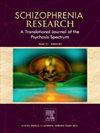“我第一眼看到他就知道了”:第一印象预示着他是否愿意与精神分裂症患者互动
IF 3.5
2区 医学
Q1 PSYCHIATRY
引用次数: 0
摘要
被诊断为精神分裂症的个体经常经历社交障碍,这些困难可能早在第一次接触时就出现了。在最初的互动中形成的第一印象对塑造关系的结果至关重要。这项研究探讨了初次相遇时形成的第一印象如何影响健康个体和精神分裂症患者之间社会互动的质量。我们招募了60名参与者,包括20名健康个体作为互动伙伴,20名被诊断为精神分裂症的个体,以及20名年龄和性别匹配的健康对照。在不知道任何诊断结果的情况下,每个互动伙伴分别与被诊断为精神分裂症的个体和与性别和年龄匹配的健康对照进行一次互动。到达实验地点后,参与者被简单地相互介绍,然后被要求独立地评价他们的第一印象。然后,他们参与了四项对话任务,之后他们评估了他们继续互动的意愿——一种衡量社会互动质量的指标。结果显示,在第一印象和继续互动的意愿方面,互动伙伴对精神分裂症患者的评价比健康对照组更负面。虽然所有参与者的第一印象评分都显著地预测了继续互动的意愿,但它们并没有调节意愿得分的组间差异,这表明还有其他潜在因素参与其中。这项研究首次评估了精神分裂症患者在生态环境中的第一印象,标志着在理解导致精神分裂症患者第一印象改变的因素方面迈出了重要的一步。本文章由计算机程序翻译,如有差异,请以英文原文为准。

“The second I laid eyes on him I knew”: First impressions predict willingness to interact with individuals with schizophrenia
Individuals diagnosed with schizophrenia often experience social interaction deficits, and these difficulties may arise as early as the first encounter. First impressions, formed during initial interactions, are crucial in shaping relationship outcomes. This study explored how first impressions formed during initial encounters influence the quality of social interactions between healthy individuals and those with schizophrenia. We recruited 60 participants, including 20 healthy individuals to serve as interacting partners, 20 individuals diagnosed with schizophrenia, and 20 age and sex-matched healthy controls. Each interacting partner interacted once with an individual diagnosed with schizophrenia and once with a sex- and age-matched healthy control, without knowledge of any diagnosis. Upon arrival at the experiment location, participants were briefly introduced to each other and then asked to rate their first impressions independently. Then, they engaged in four conversational tasks, after which they assessed their willingness to continue interacting—a measure of social interaction quality. Results showed that interacting partners rated individuals with schizophrenia more negatively than healthy controls in both first impressions and willingness to continue interacting. While first impression ratings across all participants significantly predicted willingness to continue interacting, they did not mediate the group differences in willingness scores, suggesting the involvement of additional underlying factors. This study is the first to assess first impressions of individuals with schizophrenia in ecological settings, marking an important step toward understanding the factors contributing to altered first impressions of individuals diagnosed with schizophrenia.
求助全文
通过发布文献求助,成功后即可免费获取论文全文。
去求助
来源期刊

Schizophrenia Research
医学-精神病学
CiteScore
7.50
自引率
8.90%
发文量
429
审稿时长
10.2 weeks
期刊介绍:
As official journal of the Schizophrenia International Research Society (SIRS) Schizophrenia Research is THE journal of choice for international researchers and clinicians to share their work with the global schizophrenia research community. More than 6000 institutes have online or print (or both) access to this journal - the largest specialist journal in the field, with the largest readership!
Schizophrenia Research''s time to first decision is as fast as 6 weeks and its publishing speed is as fast as 4 weeks until online publication (corrected proof/Article in Press) after acceptance and 14 weeks from acceptance until publication in a printed issue.
The journal publishes novel papers that really contribute to understanding the biology and treatment of schizophrenic disorders; Schizophrenia Research brings together biological, clinical and psychological research in order to stimulate the synthesis of findings from all disciplines involved in improving patient outcomes in schizophrenia.
 求助内容:
求助内容: 应助结果提醒方式:
应助结果提醒方式:


